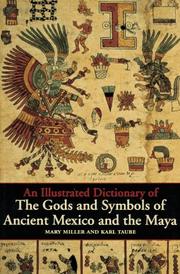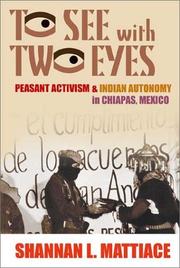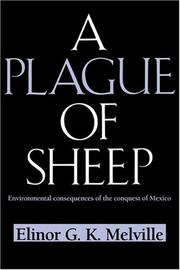| Listing 1 - 10 of 10 |
Sort by
|
Book
Year: 2003 Publisher: Gent Universiteit Gent
Abstract | Keywords | Export | Availability | Bookmark
 Loading...
Loading...Choose an application
- Reference Manager
- EndNote
- RefWorks (Direct export to RefWorks)
Book
Year: 2003 Publisher: Gent Universiteit Gent
Abstract | Keywords | Export | Availability | Bookmark
 Loading...
Loading...Choose an application
- Reference Manager
- EndNote
- RefWorks (Direct export to RefWorks)

ISBN: 0500279284 Year: 2003 Publisher: Londen Thames and Hudson
Abstract | Keywords | Export | Availability | Bookmark
 Loading...
Loading...Choose an application
- Reference Manager
- EndNote
- RefWorks (Direct export to RefWorks)
History of civilization --- Central America --- Mexico --- symbolism [artistic concept] --- Pre-Columbian [American] --- Mesoamerican
Book
Year: 2003 Publisher: Oxford Oxford University Press
Abstract | Keywords | Export | Availability | Bookmark
 Loading...
Loading...Choose an application
- Reference Manager
- EndNote
- RefWorks (Direct export to RefWorks)
Ethnology. Cultural anthropology --- History as a science --- history [discipline] --- plays [performing arts compositions] --- Pre-Columbian [American] --- Maya [culture or style] --- Guatemala --- Mexico
Book
ISBN: 2707140805 2707140813 Year: 2003 Volume: 153-154 Publisher: Paris La Découverte/Poche
Abstract | Keywords | Export | Availability | Bookmark
 Loading...
Loading...Choose an application
- Reference Manager
- EndNote
- RefWorks (Direct export to RefWorks)
Anthropophagy --- Cannibalism --- Cannibalisme --- Human sacrifice --- Indianen van Mexico --- Indians of Mexico --- Indians of Mexico--Ethnology --- Indiens du Mexique --- Kannibalisme --- Mensenoffer --- Meso-America --- Meso-American Indians --- Mesoamerica --- Mesoamerican Indians --- Mexico [Indianen van ] --- Mexique [Indiens du ] --- Offer [Mensen] --- Pre-Columbian Indians --- Precolumbian Indians --- Sacrifice [Human ] --- Sacrifice humain --- Sacrifices humains --- Cortés, Hernãn, --- Mexico --- Mexique --- History --- Histoire --- Cortés, Hernán, --- Conquest, 1519-1540 --- Cortes (hernan, dit fernand cortez), conquistador espagnol, 1485-1547 --- Indiens --- Premiers contacts avec les occidentaux --- 1519-1540 (conquete) --- Ouvrages avant 1800

ISBN: 0521801672 0521617448 0511549954 Year: 2003 Publisher: New York Cambridge Melbourne Cambridge University Press
Abstract | Keywords | Export | Availability | Bookmark
 Loading...
Loading...Choose an application
- Reference Manager
- EndNote
- RefWorks (Direct export to RefWorks)
For the same reasons that explorers of the early twentieth century strove to reach the poles, and their modern counterparts journey to outer space, most people want to visualize the contours of the human experience - the peaks of adaptive success that led to the expansion of civilization, and the troughs in which human presence ebbed. The Backbone of History defines the emerging field of macrobioarchaeology by gathering skeletal evidence on seven basic indicators of health to assess chronic conditions that affected individuals who lived in the Western Hemisphere from 5000 BC to the late nineteenth century. Signs of biological stress in childhood and of degeneration in joints and in teeth increased in the several millennia before the arrival of Columbus as populations moved into less healthy ecological environments. Thus, pre-Colombian Native Americans were among the healthiest and the least healthy groups to live in the Western Hemisphere before the twentieth century.
European Americans --- African Americans --- Human remains (Archaeology) --- Indians --- Health and hygiene --- History --- Food --- America --- Antiquities --- Congresses --- Aborigines, American --- American aborigines --- American Indians --- Amerindians --- Amerinds --- Pre-Columbian Indians --- Precolumbian Indians --- Ethnology --- Skeletal remains (Archaeology) --- Human skeleton --- Primate remains (Archaeology) --- Europeans --- Whites --- Afro-Americans --- Black Americans --- Colored people (United States) --- Negroes --- Africans --- Blacks --- Civilization --- Americas --- New World --- Western Hemisphere --- Bioarchaeology --- Indigenous peoples --- Black people --- White people --- Arts and Humanities --- #A0507HI

ISBN: 0826323154 Year: 2003 Publisher: Albuquerque : University of New Mexico Press,
Abstract | Keywords | Export | Availability | Bookmark
 Loading...
Loading...Choose an application
- Reference Manager
- EndNote
- RefWorks (Direct export to RefWorks)
Indians of Mexico --- Mayas --- Indiens d'Amérique --- Government relations. --- Politics and government. --- Relations gouvernementales --- Relations avec l'Etat --- Politique et gouvernement --- Chiapas (Mexico) --- Chiapas (Mexique) --- History --- Histoire --- #SBIB:328H32 --- #SBIB:39A11 --- #SBIB:39A74 --- Maya Indians --- Mayans --- Indians of Central America --- Indians of North America --- Indigenous peoples --- Meso-America --- Meso-American Indians --- Mesoamerica --- Mesoamerican Indians --- Pre-Columbian Indians --- Precolumbian Indians --- Ethnology --- Government relations --- Politics and government --- Instellingen en beleid: Midden en Latijns-Amerika --- Antropologie : socio-politieke structuren en relaties --- Etnografie: Amerika
Book
ISBN: 1423734254 9781423734253 Year: 2003 Publisher: [Place of publication not identified] Brill Academic
Abstract | Keywords | Export | Availability | Bookmark
 Loading...
Loading...Choose an application
- Reference Manager
- EndNote
- RefWorks (Direct export to RefWorks)
Diseases and history --- Indians --- Military art and science --- Americas - General --- Regions & Countries - Americas --- History & Archaeology --- Military history --- Naval history --- Aborigines, American --- American aborigines --- American Indians --- Amerindians --- Amerinds --- Pre-Columbian Indians --- Precolumbian Indians --- Ethnology --- Indigenous peoples --- Diseases --- History and diseases --- History --- First contact with Europeans --- Civilization --- Influence on history --- First contact with other peoples --- America --- Europe --- Territorial expansion. --- Colonies --- Council of Europe countries --- Eastern Hemisphere --- Eurasia --- History.

ISBN: 9780275980924 0275980928 0275980731 Year: 2003 Publisher: Westport: Praeger,
Abstract | Keywords | Export | Availability | Bookmark
 Loading...
Loading...Choose an application
- Reference Manager
- EndNote
- RefWorks (Direct export to RefWorks)
The book The Columbian Exchange changed the field of history drastically and forever as well. It has become one of the foundational works in the burgeoning field of environmental history, and it remains one of the canonical texts for the study of world history. This 30th anniversary edition of The Columbian Exchange includes a new preface from the author, reflecting on the book and its creation, and a new foreword by J. R. McNeill that demonstrates how Crosby established a brand new perspective for understanding ecological and social events. As the foreword indicates, The Columbian Exchange remains a vital book, a small work that contains within the inspiration for future examinations into what happens when two peoples, separated by time and space, finally meet.
Indians --- Medical geography --- Biogeography --- Diseases --- Agriculture --- History --- Géographie médicale --- Découverte et exploration --- Géographie médicale --- Découverte et exploration --- History of civilization --- World history --- anno 1500-1799 --- anno 1800-1999 --- Geographical distribution of diseases --- Geographical pathology --- Geography, Medical --- Geomedicine --- Medical topography --- Pathology, Geographic --- Topography, Medical --- Geography --- Medical climatology --- World health --- Aborigines, American --- American aborigines --- American Indians --- Amerindians --- Amerinds --- Pre-Columbian Indians --- Precolumbian Indians --- Ethnology --- Areography (Biology) --- Geographical distribution of animals and plants --- Species --- Species distribution --- Biology --- Geographical distribution --- Civilization --- #A0509HI --- Public health --- Indiens d'Amérique --- Biogéographie --- Santé publique --- Maladies --- Histoire --- America --- Amérique --- Discovery and exploration --- History. --- Indigenous peoples --- Diseases. --- Indians - Diseases --- Indians - Agriculture --- Medical geography - History

ISBN: 052142061X 052157448X 1139930206 1139927256 1139931717 1139933701 113993922X 1139929488 0511571097 1139936905 9780521420617 9780511571091 9780521574488 Year: 2003 Publisher: Cambridge: Cambridge university press,
Abstract | Keywords | Export | Availability | Bookmark
 Loading...
Loading...Choose an application
- Reference Manager
- EndNote
- RefWorks (Direct export to RefWorks)
This is a book about the biological conquest of the New World. Taking as a case study the sixteenth-century history of a region of highland central Mexico, it shows how the environmental and social changes brought about by the introduction of Old World species aided European expansion. The book spells out in detail the environmental changes associated with the introduction of Old World grazing animals into New World ecosystems, demonstrates how these changes enabled the Spanish takeover of land, and explains how environmental changes shaped the colonial societies.
Sheep --- Animal introduction --- Grazing --- Pastoral systems --- Human ecology --- Indians of Mexico --- Ecology --- History --- Environmental aspects --- Mezquital Valley (Hidalgo, Mexico) --- Mexico --- Environmental conditions --- -Grazing --- -Pastoral systems --- -Sheep --- -Animal introductions --- Animal translocation --- Animal translocations --- Exotic animal introduction --- Introduction of animals --- Introductions of animals --- Translocation of animals --- Translocations of animals --- Acclimatization --- Zoology, Economic --- Pest introduction --- Domestic sheep --- Ovis aries --- Red sheep --- Ovis --- Shepherds --- Wool --- Herding systems --- Pastoralism --- Animal culture --- Livestock systems --- Herding --- Animal feeding --- Range management --- Rangelands --- -Valle del Mezquital (Hidalgo, Mexico) --- -Environmental conditions --- -Human ecology --- -Indians of Mexico --- -Domestic sheep --- Indians of North America --- Indigenous peoples --- Meso-America --- Meso-American Indians --- Mesoamerica --- Mesoamerican Indians --- Pre-Columbian Indians --- Precolumbian Indians --- Environment, Human --- Human beings --- Human environment --- Animal introductions --- -History --- -Environmental aspects --- -Ecology --- -Ethnology --- Social aspects --- Meksiko --- Stany Zjednoczone Meksyku --- Meksyk --- Estados Unidos Mexicanos --- Meḳsiḳe --- Mexique (Country) --- Messico --- Méjico --- República Mexicana --- United States of Mexico --- United Mexican States --- Anáhuac --- メキシコ --- Mekishiko --- מקסיקו --- Livestock --- Herders --- Ethnology --- Ecological engineering --- Human geography --- Nature --- Agricultural systems --- Pastures --- Zoogeography --- Effect of environment on --- Effect of human beings on --- Valle del Mezquital (Hidalgo, Mexico) --- History. --- Spanish colony, 1540-1810 --- 16th century --- Conquest, 1519-1540 --- Sheep - Mexico - Mezquital Valley (Hidalgo) - Ecology - History - 16th century. --- Animal introduction - Environmental aspects - Mexico - Mezquital Valley (Hidalgo) - History - 16th century. --- Grazing - Environmental aspects - Mexico - Mezquital Valley (Hidalgo) - History - 16th century. --- Pastoral systems - Environmental aspects - Mexico - Mezquital Valley (Hidalgo) - History - 16th century. --- Human ecology - Mexico - Mezquital Valley (Hidalgo) - History - 16th century. --- Indians of Mexico - Mexico - Mezquital Valley (Hidalgo) - History - 16th century. --- Mezquital Valley (Hidalgo, Mexico) - Environmental conditions - History. --- Mexico - History - Conquest, 1519-1540. --- History of Mexico --- anno 1500-1599 --- Social Sciences --- Anthropology --- Sheep - Ecology - Mexico - Mezquital Valley (Hidalgo) - History - 16th century --- Animal introduction - Environmental aspects - Mexico - Mezquital Valley (Hidalgo) - History - 16th century --- Grazing - Environmental aspects - Mexico - Mezquital Valley (Hidalgo) - History - 16th century --- Pastoral systems - Environmental aspects - Mexico - Mezquital Valley (Hidalgo) - History - 16th century --- Human ecology - Mexico - Mezquital Valley (Hidalgo) - History - 16th century --- Indians of Mexico - Mexico - Mezquital Valley (Hidalgo) - History - 16th century --- Mezquital Valley (Hidalgo, Mexico) - Environmental conditions - History --- Mexico - History - Conquest, 1519-1540 --- Mexico - History - Spanish colony, 1540-1810
| Listing 1 - 10 of 10 |
Sort by
|

 Search
Search Feedback
Feedback About UniCat
About UniCat  Help
Help News
News